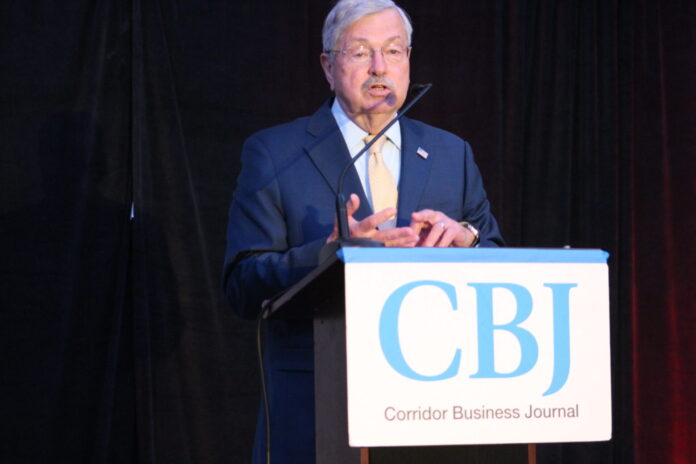
At the CBJ’s first China & Trade Symposium held May 26 at the DoubleTree by Hilton in downtown Cedar Rapids, former U.S. Ambassador to China Terry Branstad and a panel of experts discussed the dynamic and changing geopolitical relationship with China.
In introducing Mr. Branstad to the hybrid in-person and online audience, Randy Williams, owner and general manager of event sponsor Sino Sales & Support, lauded Iowa’s former governor’s service in the Trump administration from 2017-2020.
“During his tenure, two of his greatest achievements were the signing of the historic Phase One trade agreement between the U.S. and China in January 2020, and successfully lobbying the Chinese government to stem the flow of fentanyl into the United States,” Mr. Williams said. “Phase One trade deals secured $200 billion in Chinese commitments to purchase U.S. goods and services in agriculture, manufacturing, energy and other sectors. It achieves stricter enforcement of intellectual property protections and opened up China’s restrictive financial sector in U.S. banks and other financial services.”
Mr. Branstad explained that a top issue for decades when he took the job had been trade between China and the United States.
“We wanted more fairness and reciprocity in trade of promises that were made when the United States supported China becoming part of the World Trade Organization, but had never been fulfilled,” he said. “To get the Chinese’s attention, President Trump did something that was controversial but was critically important. He put tariffs on Chinese products, and that got their attention.”
After two years of negotiations, the United States and China reached an agreement in 2020 on Phase One of the trade deal.
“That included protections for intellectual property rights that have been long overdue. It also included preventing the stealing of technology and opening up some of their markets in areas like insurance and financial services,” Mr. Branstad said. “One of the big things for Iowa was the commitment of the Chinese to make major purchases of agricultural products.”
In recent months, the Chinese have purchased record amounts of corn and soybeans. They were already purchasing a significant amount of pork and are now purchasing significant amounts of beef and chicken, he added.




